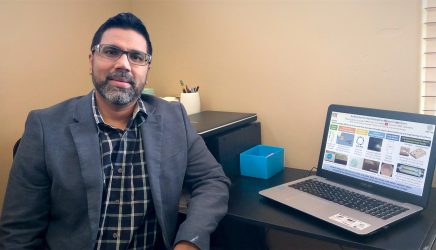Date: 10/19/2020
Writer: Tiffany Acosta, 575-646-3929, tfrank@nmsu.edu
Krishna Kota, associate professor of thermal sciences and energy in the Department of Mechanical and Aerospace Engineering at New Mexico State University, has received a nearly $250,000 Defense University Research Instrumentation Program (DURIP) grant from the Air Force Office of Scientific Research to purchase equipment for conducting research on the cooling of directed-energy weapon systems.
“Through this award, we can now have a metal additive manufacturing machine on our campus, perhaps for the first time, which will help us pursue many new areas of STEM research in addition to the core project,” Kota said.
The core project includes cooling of laser weapon systems, a type of directed-energy weapons, that have a high accuracy rate and use less power than traditional weapons. However, according to Kota, their electrical-to-optical conversion efficiencies are low leading to heat generation, which is a key wall to successful application.
A typical directed-energy weapon system’s heat density could be the equivalent magnitude as a nuclear explosion and poses considerable cooling challenges. Kota said the additive manufacturing machine will be used to explore and print novel heat sink materials, surfaces and structures with complex shapes aimed at addressing these challenges and supports NMSU’s research collaboration with the Air Force Research Laboratory.
DURIP awards are highly competitive and a joint effort between the Army Research Office, Office of Naval Research and Air Force Office of Scientific Research.
“This award will help to create new research and education opportunities in advanced manufacturing for our students,” Kota said. “They will have scope to learn about metal additive manufacturing up close. Companies such as General Electric and most of the major automotive companies are moving toward using additively manufactured metal parts in their larger systems. Soon, I think the manufacturing industry would be seeking job applicants with a knowledge of metal additive manufacturing and our students could avail the presence of this machine to gain experience and put forth an attractive job application.”
While Kota is excited to have a metal additive manufacturing machine on campus, he expects learning to operate it will require a significant time commitment.
“I think understanding the intricacies of the machine for generating desired complex-shaped metal parts with precision is the most challenging aspect,” Kota said. “We might need to invest on many hours of trial and error.”
Additionally, Kota credits both the College of Engineering and Office of the Vice President for Research with assistance in receiving the award.
“This support on particulate suspension research has played an essential role in obtaining some of the preliminary results for the proposal,” he said.
Assisting Kota on this project will be Vimal Chaitanya and Igor Sevostianov from mechanical and aerospace engineering, Delia Valles-Rosales from industrial engineering and Ehsan Dehghan-Niri from civil engineering. The team will work together on the study of corrosion and the electrochemical behavior, material micro-structural defects, micro-mechanics and material properties, and reliability and quality control of the additively-manufactured heat sinks in addition to education and outreach.

